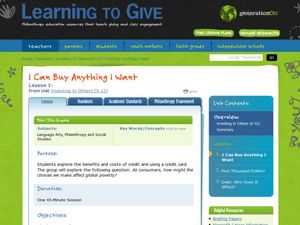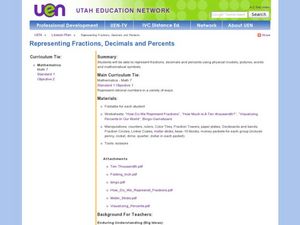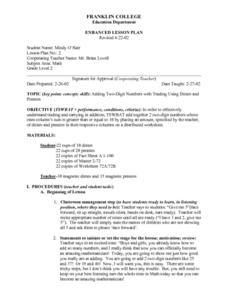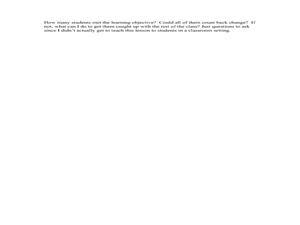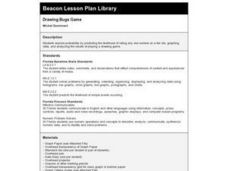Curated OER
Money Match
Students review coin identification and play a game in which they must match a coin to its value.
Curated OER
I Can Buy Anything I Want: Consumer Debt and Social Responsibility
A clear, comprehensive overview of consumer debt, credit, interest, international currency, and social responsibility, this 45-minute session falters in the application stage. You'll need to create a way for learners to demonstrate their...
Curated OER
Estimation
Select items to purchase from a store, add up the total cost, then estimate the total cost! Kids count out the money needed to make the purchase and pay for the items. An excelent way to connect real life math and estimation!
Illustrative Mathematics
Field Day Scarcity
Introduce young mathematicians to concepts of financial literacy with this open-ended word problem. With seven dollars to spend during field day and given a list of available items and their prices, children must determine how they want...
Curated OER
Representing Fractions, Decimals, and Percents
In this fractions, decimals, and percents lessons, students explore various methods of representing fractions. They demonstrate situations that represent rational numbers. Students create a foldable exploring fractions, decimals and...
Curated OER
Mental Money
Learners access prior knowledge to round numbers and add decimals. In this mental math lesson plan, students share the book Betcha and calculate estimates for three jars based on the book. Learners calculate money answers based on coins...
Curated OER
Adding Two Digit Numbers with Using Dimes and Pennies
Second graders participate in a math game using dimes and pennies. They practice combining coins to make a given amount of money, and they use the combinations to practice adding two digit numbers. Teacher assessment strategies and...
Illustrative Mathematics
Gifts from Grandma, Variation 3
There are three money word problems in this activity, each one is set in the same context. The first asks what was the total amount grandma spent, the second how many grandchildren grandma has, and the third asks how much grandma spent...
Curated OER
History of Toys and Games
Students research history of popular toys to learn when those toys were first introduced. They use measurement skills to create an accurate timeline.
Project Maths
Outcomes of Coin Tosses
Flip a coin: heads, use the resource; tails, use the resource. The fourth of six installments of the Statistics & Probability unit looks at coin tosses and probability. The class conducts an experiment and sees that the outcomes of...
Curated OER
The Stock Market Game
Students participate in The Stock Market Game. After selecting a name for their group, students invest $10,000 imaginary money and determine which stocks to purchase.
Curated OER
Pocket Change
Students practice identifying coins and their values. In this money identification lesson, students play a game, where they toll a coin, determine the value, and compare totals to win.
Curated OER
The Cube and Coin Challenges
Second graders participate in several games based on colored cubes and coins. They try to figure out the relative rate at which things happen and assess the concept of playing a fair game with their peers. Each student compare familiar...
Curated OER
Battle of "The Cents"
Young scholars explore money. In this counting money lesson, students play a card game using the rules of "War." Young scholars turn over cards, determine the money value represented, and the student with the highest value keeps the cards.
Curated OER
Money Game
Fourth graders give change of one dollar. In this decimal and fractions instructional activity, 4th graders receive fake coins and discuss what they could purchase with them. Students go for a walk and spend one dollar and get their...
Alabama Learning Exchange
No More Money Trouble
Young consumers explore money identification and counting. In this cross-curricular money instructional activity, they participate in comprehension and writing activities prior to and after reading the book Money Trouble by Bill Cosby....
Curated OER
Medieval Money
Students investigate the history of money as it was back then compare to now. In this algebra lesson, students analyze the type of money used in medieval times, the value of the currency and the coins used. They make a budget using...
Curated OER
Scavenger Hunt for Coins of the World--New Zealand, Japan and France!
Students explore the history, culture and currency of the countries they "visit" using the US Mint Coins of the World activity. Students find the answers to a Scavenger Hunt Questions handout for the country being studied. Students...
Curated OER
Rice Math
Fourth graders practice basic subtraction facts using a number grid. In this rice math lesson, 4th graders figure out how much more they need to get to a specific number. Students complete a chart of examples and then play a game.
Curated OER
First Grade Math Jeopardy
"Jeopardy" review games are an effective way to review math concepts for 1st-2nd graders. Counting money and telling time is the focus of this presentation. Tip: Make this a math center in your room.
Curated OER
Drawing Bugs Game
Second graders explore probability by playing a drawing game with dice. After they roll a die, they draw a tree diagram to illustrate each of the possible outcomes.
Curated OER
Estimating and Counting Money
Students explore the concepts of estimating and rounding. In this estimating and rounding instructional activity, students play a game of tic-tac-toe. Students pick items and must estimate their cost by rounding. Students estimate the...
Curated OER
Money Talks Canadian Money
Students use newspapers, games and journal writing activities to examine the importance of money and the role it plays in daily life. They complete several math problems, fill out worksheets and practice changing varying amounts.
Curated OER
Money as a Means of Exchange
First graders discover the term bartering as used to pay for wanted items. They play a bartering game to discover exchanging goods for wanted items and play the computer money game on the "Show-Me Economics" web site.



